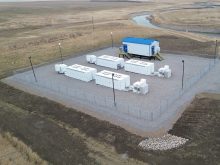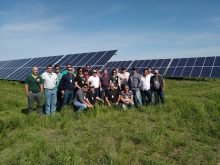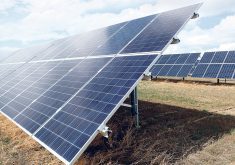A 400 megawatt solar project that will cover 2,800 acres outside of Brooks, Alta., is moving forward following a contested Alberta Utilities Commission (AUC) approval process.
The Solar Krafte Brooks Solar Farm is the latest of more than a half-dozen solar projects that make up the company’s Prairie Sunlight portfolio, which has solar farms either proposed, approved or built along Highway 36.
The Brooks Solar Farm, which will be one of Canada’s largest, faced resistance from local landowners who argued the project would impede the use of land for agriculture, have negative ecological impacts and devalue property.
Read Also

Pakistan reopens its doors to Canadian canola
Pakistan reopens its doors to Canadian canola after a three-year hiatus.
Those contesting the project, mostly local landowners who formed the Cassilope Group, also argued whether the Eastern Irrigation District, which negotiated the lease agreement for the solar farm on land owned by them, had the authority to change its land use.
The AUC ruled land outside the project area would not be affected for use as cattle grazing while land inside would be grazed by sheep.
The AUC also said in its decision the EID, “is a private landowner and voluntarily entered into a lease with Solar Krafte knowing of the potential impacts of the project including the reduction of available grazing lands.”
The AUC rejected the plan to install solar panels across one of the eight sections of the solar farm’s footprint based on environmental arguments by the Cassilope Group.
But the AUC rejected arguments the project would have an excessive impact on property values in the region.
Regarding opponents’ arguments that there weren’t adequate public consultations, the AUC found Solar Krafte engaged with stakeholders multiple times, including those from the Cassilope Group. However, in-person consultations couldn’t be held due to the COVID-19 pandemic.
The AUC also ruled it was reasonable for the company to enter into lease negotiations with EID prior to releasing information to the general public regarding the plan to build the project.
Cassilope members argued the project would result in them experiencing, “new, increased, and adverse visual aesthetics impacts, an unwanted visual burden, as a result of the development of the project.”
The AUC found those visual impacts would be minimal.
Concerns raised about end-of-lifetime reclamation of the project were also raised to the AUC.
Solar Krafte committed to follow the rules and regulations surrounding project decommissioning. The company said specific details of what that entails are, “governed under a private contractual obligation to reclaim project lands in accordance with the terms of its confidential lease agreements, including agreements with the Eastern Irrigation District.”
The project straddles Highway 36 east of the City of Brooks and south of the Trans-Canada Highway.
Solar Krafte’s Prairie Sunlight website states they have, in addition to the Brooks Solar Farm, three projects near Vauxhall along with one each near Wrentham, Strathmore and Spring Coulee.
Contact alex.mccuaig@producer.com
















